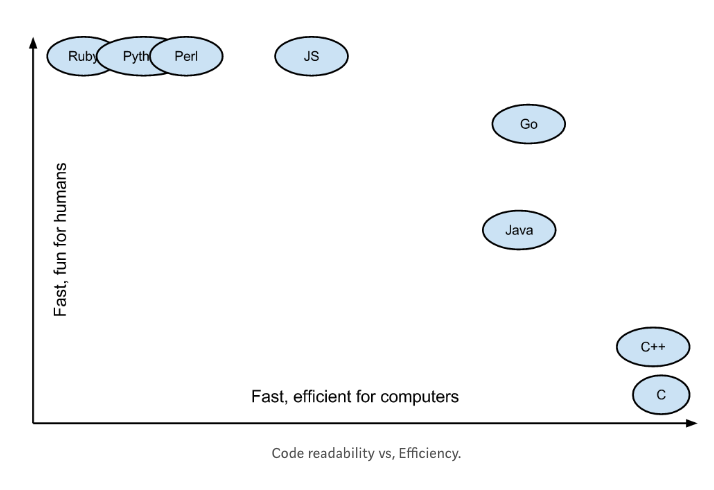That's GO
golang introduction
Problems
- 使用 C++ 作為 sever 需要額外使用 Java 跟 Python
- 大量工程師與非常大量程式碼
- 分散式系統 - threads 效能
- 許多 compute cluster
Purpose
- Concurrent
- https://tour.golang.org/concurrency/1
- Quickly Compiled (Compare with C/C++)
- GC
Main Stuff
- 開放原始碼 (open source)
- 靜態型別的編譯語言;但語法類似腳本語言 (scripting language)
- 跨平台 (cross-platform)
- 內建全自動的垃圾回收 (garbage collection),可手動調整
- 內建平行處理 (concurrency)
- 輕量級物件 (object) 系統
- 程式風格強制統一
- 快速編譯
- 內建開發相關工具
- 豐富的標準函式庫
- 成長中的社群資源
Couple Features
- godoc
- go test
- cross compile
- golang-crosscompile
// Compile file
go build
// Test (*_test.go)
go test
// formatting
go fmt
// install package
go get
// analysis possible bug
go vert
// quickly build and run
go run
// show go document
godoc
Code readability or efficiency

Declaretion
// variable v1
var name string
name = "Stanney"
// variable v2
name := "Stanney"
// const
const PI = 3.14159
var
const
func
type
Data Types
-
基本型別 (basic types)
- 整數 (Eg. int8)
- 浮點數 (Eg. float32)
- 複數 (Eg. complex64)
-
聚合型別 (aggregate types)
- array
- struct
-
參考型別 (reference Types)
- pointer
- slice
- map
- function
- channels
- 介面型別 (interface types)
Struct
package main
import (
"fmt"
)
type Point struct {
x float64
y float64
}
func main() {
p := Point{x: 3.0, y: 4.0}
fmt.Println(p.x)
fmt.Println(p.y)
}Array & Slice
package main
import "log"
func main() {
var langs [4]string
langs[0] = "Go"
langs[1] = "Python"
langs[2] = "Ruby"
langs[3] = "PHP"
if !(langs[0] == "Go") {
log.Fatal("Wrong string")
}
}package main
import "fmt"
func main() {
langs := []string{"Go", "Python", "Ruby", "PHP"}
for _, e := range langs {
fmt.Println(e)
}
}Map
package main
import (
"fmt"
)
func main() {
m := make(map[string]string)
m["Go"] = "Beego"
m["Python"] = "Django"
m["Ruby"] = "Rails"
m["PHP"] = "Laravel"
for i := 0; i < 10; i++ {
for k, v := range m {
fmt.Println(fmt.Sprintf("%s: %s", k, v))
}
fmt.Println("")
}
}Pointer
package main
import (
"fmt"
)
type Point struct {
x float64
y float64
}
func main() {
p := new(Point)
p.x = 3.0
p.y = 4.0
fmt.Println(fmt.Sprintf("(%.2f, %.2f)", p.x, p.y))
}Class ?
package main
import (
"log"
"math"
)
type Point struct {
x float64
y float64
}
func NewPoint(x float64, y float64) *Point {
p := new(Point)
p.SetX(x)
p.SetY(y)
return p
}
func (p *Point) X() float64 {
return p.x
}
func (p *Point) Y() float64 {
return p.y
}
func (p *Point) SetX(x float64) {
p.x = x
}
func (p *Point) SetY(y float64) {
p.y = y
}
func Dist(p1 *Point, p2 *Point) float64 {
xSqr := math.Pow(p1.X()-p2.X(), 2)
ySqr := math.Pow(p1.Y()-p2.Y(), 2)
return math.Sqrt(xSqr + ySqr)
}
func main() {
p1 := NewPoint(0, 0)
p2 := NewPoint(3.0, 4.0)
if !(Dist(p1, p2) == 5.0) {
log.Fatal("Wrong value")
}
}Install Go
- Download pkg: https://golang.org/dl/
or brew install go - 透過 pkg 的需要額外設定以下至 bashrc or zshrc
#GOROOT
export GOROOT=/usr/local/go
#GOPATH
export GOPATH=$HOME/Documents/go_workspace
#GOROOT bin
export PATH=$PATH:$GOROOT/bin
#GOPATH bin
export PATH=$PATH:$GOPATH/binHello, World
- 在 go_workspace 下面新增 src/hello 資料夾
- 新增一個 hello.go,並打上下方的 code
- 在 src/hello 下方執行 go build,便會產生一個 .hello 執行檔
- ./hello 便會出現一個 "hello, world"
package main
import "fmt"
func main() {
fmt.Printf("hello, world\n")
}Go Restful
- 原生有 net/http 函式庫
- 下方程式碼便可運行在 localhost:8080 上
package main
import (
"fmt" // printf
"html"
"log"
"net/http" // Package http provides HTTP client and server implementations
)
func main() {
http.HandleFunc("/", func(w http.ResponseWriter, r *http.Request) {
fmt.Fprintf(w, "Hello, %q", html.EscapeString(r.URL.Path))
})
log.Fatal(http.ListenAndServe(":8080", nil))
}
Demo
step by step refactor
Golang Introduction
By Stanney Yen
Golang Introduction
- 495



